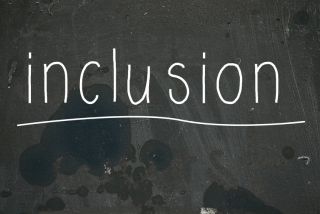Introversion
Beyond the Water Cooler: New Way for Introverts to Connect
You’re not alone—unless you want to be
Posted March 7, 2014

Cheryl Cofield, director of culture, diversity and inclusion, Georgia Tech
I love “firsts,” and here’s one for introverts: the Georgia Institute of Technology is offering its employees an employee resource group (ERG) specifically for introverts. According to Tech’s website, its introvert ERG “provides a safe forum for introverts to explore their unique gifts and examine the ‘quiet’ nature of their significant contributions.” In our discussion that follows, Cheryl Cofield, Tech’s director of culture, diversity and inclusion—and an introvert herself—explains how introverts can benefit from this type of connecting, what it means for them and for the institute.
NA: You talk about creating a culture that “remembers introverts” at Georgia Tech. What does that mean?
CC: Many working environments are unknowingly designed for extroverts because theirs is the dominant style in Western culture. In order to foster a culture that welcomes, enables, and affirms introverts at Georgia Tech, we are developing introvert-friendly hiring processes and procuring “job aids” to enhance introverts’ ability to thrive in the workplace. For instance, we’ll recommend purchasing headphones with apps containing “white noise,” “pink noise,” ocean waves, rainfall, or other sounds found in nature; magnets, mugs, over-the-door hangers and cube curtains that say things like “introvert at work.” Also, perhaps journals similar to the conceptual box that artist Jayne Riew created for [Quiet author] Susan Cain; it is designed for users who prefer writing to speech and who savor time for deep contemplation. In addition, we’re creating official protocols for proactive reflection. We’re lobbying for units to occasionally present issues prior to meetings so introverts can reflect and gather their thoughts before being forced to spurt unfiltered ideas into “brainstorming” atmospheres. We’re also asking units to consider designating short timeslots—for example, the fourth Wednesday morning of each month—as “no meeting” zones.

We’re also working with our IT department to designate one area as an introvert “chill zone” and are preparing to ask campus officials about designating a quiet time at Under the Couch (UTC), a live music venue and recording studio located in Tech’s student center. While UTC provides a variety of services like live shows, open mike nights, and a 16-track studio recording facility, we think it would also serve as a nice space for introverts because of its lounge-like and serene atmosphere. We’re hoping to negotiate a weekly hour designated as an introvert “chill zone.”
We also have been offered a seat at the table for Tech’s library revitalization project to lobby for the configuration of innovative spaces optimal for staff, faculty, and students who need moments to reflect, process, and rejuvenate. While Tech is already contemplating a wide variety of space typologies that successfully support all individuals, as stakeholders, we’re specifically promoting the idea of private, serene, and calming thinking environments designed for introspection, reflection, and thoughtfulness—with visual and acoustic separation—and little outside sensory stimulation and/or distraction.
Tech is just beginning to define and develop the program for the research library for the 21st century. We were delighted when the design team invited us to share our voices, and are encouraged that we will steer clear of a “one-size-fits-all” approach that treats introverts as an afterthought.
NA: How do you define employee resource groups (ERGs) at Georgia Tech? How do they contribute to the overall work environment?


Employee resource groups are voluntary employee associations, organized around common dimensions of diversity, which have three foci: recruitment and work-life support activities that support retention; camaraderie and community building; and career development, mentoring, and networking opportunities.
More than 130 staff, administrators, and faculty members attended the initial kick-off meeting for our Introvert ERG, known as the Web of Brilliance. Members broke the ice by sharing poignant “six word stories” reminiscent of Ernest Hemingway’s "Baby Shoes. For Sale. Never Worn."
The six-word memoir exercise had a real appeal for ERG members and produced stories such as, “Almost gave up. Glad I didn’t.” “Abandoned at birth. Thanking God everyday.” “Died from within and came alive.” “Grew up broken. Finding wholeness daily.” “Turned down. Failed often. Still here.” “A traveler’s soul. Everywhere is home.” “It’s my birthday!…All by myself…” After that, participants engaged in a think tank/affinity mapping reflection collage in which they contributed ideas to the ERG’s annual business plan. During the next membership meeting we will unveil the 2014 annual plan and begin this trailblazing journey.
NA: What inspired you to create an employee resource group for introverts? What challenges is it addressing? What contribution do you hope it can make at Georgia Tech?
CC: As I transitioned from the aggressively fast-paced, results-driven culture of Wal-Mart’s Global Home Office, I began recognizing the complex nature of my own temperament. I realized that while I had been sort of “playing an extrovert on TV” to survive that corporate culture, it was safe to “come out” of my introverted closet to embrace my truer nature in this more cerebral and introspective academic environment.
I was solemnly present to the challenges introverts face in getting work done in open, collaborative spaces because of chatter, overheard conversations, people moving in and out of our fields of vision, and loud, distracting, nerve-wracking stimulation. I was all at once drained by the thought of hiding my “When E.F. Hutton speaks, everyone listens” ways, and wearing an extrovert mask another single day. My heart ached at being so misunderstood for needing to listen deeply, synthesize ideas, and to quietly contemplate before making decisions. I realized how exhausted I was from hiding my need for more time alone—time to preserve my inner energy reserves and guard against overstimulation and burnout.
More importantly, I considered my wonderful colleagues. It occurred to me that the phrase “It’s not rocket science” was misplaced at Georgia Tech since this is a playground for rocket scientists and aerospace engineers, and it actually is about rocket science in this sandbox. As I became more present to the analytical, contemplative, and life-changing nature of the work of our scientists, engineers, mathematicians, and researchers, I wondered what more might be done to further support Tech’s dense pockets of quiet brilliance. I began imagining possible intersections in the ways introverts may be misinterpreted, as well as the potential commonalities in their desires to be left alone to perfect equations and formulas, produce one-of-a-kind works, and otherwise improve the human condition—without the buzz of constant interruption and interaction.
In the end, since Tech is renowned for fostering innovation, I thought it would be fitting to develop an innovative way to support and affirm staff, faculty, and students who embrace this important, yet rarely talked about, dimension of diversity.
NA: How can employees at Georgia Tech benefit by joining the employee resource group for introverts?
CC: Since introverts are generally modest and reserved people who rarely seek the limelight, their strengths are often masked and their intellectual depth is often discounted or overlooked. The ERG promotes the interests of individuals who self-identify as introverts and educates those who work with or otherwise interact with introverts. It provides a safe forum for introverts to explore their unique gifts and quiet nature of their significant contributions. It also brings active awareness to the impact introversion has on work style as well as the challenges introverts face in extrovert-ideal workplaces. It dispels notions that extroversion is “right” and introversion is somehow “wrong”—reframing introversion as an interesting aspect of identity as well.
NA: What other ERGs has Georgia Tech created, and how might you approach the introvert ERG differently? What challenges does the group currently face?
CC: In addition to introverts’ Web of Brilliance, we have also created groups for African heritage, Hispanic/Latinos, LGBTQ, veterans, and women. While these are the standard constituencies that many other organizations provide support for, the introvert group is unique because it is the first of its kind in the nation. The approach is, therefore, being “birthed” day by day.
The plan for this ERG is designed and managed by introverts with introvert sensibilities in mind. There will continue to be a spaciousness to our approach. There will be room to think, room to breathe, room to reflect, room to be who we are…no forced “extroverting” required.
The challenges are subtle but painful. We get more clever jokes and comments than you’d ever imagine about the group. People have a great time joking and asking questions such as, “What if no one talked?” “Is this a 12-step support group?" “Isn’t a group for introverts an oxymoron or contradiction in terms?”
While the comments are often well-intended, they can land negatively on introverts who are already up against unfair stigmas originating back to Sigmund Freud, who described introversion as a form of narcissism and low-grade pathology before his “crown prince and successor" Carl Jung morphed the term toward its present meaning.


NA: What kinds of initiatives and activities does Georgia Tech have planned for the introverts’ Web of Brillance ERG this year?
We’ll spread the good word of Tech’s pioneering innovation by creating a blog for introverts, branding introvert-related collateral, showcasing Tech’s introverted executives and leaders, and sharing thought leadership around this at national and global conferences. We’ve presented on the impact introversion has on work style and the challenges introverts face in extrovert-ideal workplaces for The Conference Board and Atlanta Diversity Management Advocacy Group, and have been tapped to present similarly at a plethora of upcoming national conferences.


In future months, we’ll engage introverted employees through special interest groups such as TED Talk discussion circles, local/regional/national “travel clubs” that tour state-of-the-art innovation centers, and a “Special Edition Toastmasters” club tailored for introverts. Finally, we’ll begin designing a professional development series in late Spring focused on embracing the unique strengths of introverts, getting noticed, becoming better conversationalists/public speakers, and strategies for ensuring the success of introverted students and leaders.
NA: Work life has special challenges for many introverts and those who work with them. Congratulations on addressing those challenges, creating a better workplace for introverts, and raising awareness through your efforts at Tech. As discussed offline, I’m a fan of six-word stories too. And now one for you and Tech: Here’s to your quiet stars twinkling.
Copyright © 2014 Nancy Ancowitz




